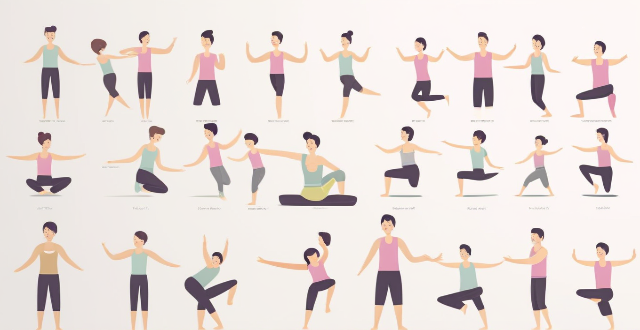Exercise Levels

How does exercise influence cortisol levels, which are associated with stress ?
Exercise has a complex relationship with cortisol levels and stress management. Acute exercise can cause a temporary increase in cortisol levels, while chronic exercise can help regulate them over time. By managing stress through regular physical activity, individuals can maintain healthy cortisol levels and improve their overall well-being. Chronic stress and persistently high cortisol levels can contribute to a range of health problems, including weight gain, high blood pressure, impaired immune function, decreased bone density, increased risk of heart disease and stroke, and mood disorders such as anxiety and depression. Regular exercise can help manage stress and maintain healthy cortisol levels by improving mood and mental health, better sleep quality, and increased resilience to stress.

Can exercise physiology help in managing stress and anxiety levels ?
Exercise physiology plays a significant role in managing stress and anxiety levels by promoting various physiological responses that counteract the negative effects of these conditions on the body. By incorporating regular physical activity into your lifestyle, you can improve your overall mental well-being and reduce the impact of stress and anxiety on your daily life.

How does exercise physiology explain the differences in fitness levels among individuals with different genetic backgrounds ?
Exercise physiology explores the interaction between genetic factors and environmental influences like exercise, nutrition, and sleep to explain variations in fitness levels among individuals. It examines how muscle fiber composition, cardiovascular efficiency, metabolic rate, and body composition affect one's ability to perform physical activities. While genetic background sets a baseline for fitness potential, lifestyle choices significantly impact an individual's actual fitness outcomes. By understanding these principles, individuals can optimize their fitness through targeted exercise training, proper nutrition, and adequate rest.

Can regular physical activity reduce anxiety levels ?
Regular physical activity can help reduce anxiety levels by improving mood, reducing stress hormones, promoting better sleep, increasing self-esteem and confidence, and providing social support. Engaging in at least 30 minutes of moderate-intensity exercise per day can significantly reduce anxiety symptoms.

How does exercising regularly impact stress levels and overall mood ?
This text discusses the impact of regular exercise on stress levels and overall mood. It highlights how physical activity can help reduce stress by releasing endorphins, regulating cortisol levels, improving self-esteem, and providing distraction from worries. Additionally, it explains how exercise enhances mood through immediate effects like increased energy and a feeling of achievement, as well as long-term outcomes such as better sleep and social interaction. The text concludes that regular exercise has a profound impact on mental well-being, promoting both looking good and feeling good.

How does exercise influence hormone regulation in the body ?
Exercise affects hormone regulation in the body, impactingExercise affects hormone regulation in the body, impacting the intensity, duration, and impacting various hormones depending on the intensity, duration, and type of exercise. Regular exercise can increase testosterone levels in men and estrogen levels in women, reduce cortisol levels, and increase growth hormone levels. It can also improve insulin sensitivity and reduce insulin resistance, as well as maintain a healthy body fat distribution. However, excessive exercise or prolonged periods of intense training can have negative effects on hormone production and lead to low testosterone levels in men, low estrogen levels in women, high cortisol levels, low growth hormone levels, worsened insulin resistance, and decreased body fat distribution. Therefore, it is important to choose an appropriate type of exercise and maintain a balanced lifestyle for optimal hormone regulation and overall health.

How do exercise programs impact employee productivity and job satisfaction ?
Exercise programs have a significant impact on employee productivity and job satisfaction. Companies can improve employee health, reduce stress levels, enhance team building, increase energy levels, improve mental clarity and cognitive function, reduce absenteeism and tardiness, enhance work-life balance, increase motivation and engagement, and improve company culture and retention rates by promoting a healthy lifestyle and providing opportunities for physical activity. Implementing exercise programs should be considered a valuable investment for any organization looking to improve its overall performance and success.

What role does cardiovascular exercise play in managing daily stressors ?
Cardiovascular exercise is an excellent way to manage daily stressors, as it reduces the body's physiological response to stress and leads to improved mental and physical health. The benefits of cardiovascular exercise include reduced stress levels, improved sleep quality, increased energy levels, and better mental health. To get started with cardiovascular exercise, set goals, start slow, find activities you enjoy, and mix up your workouts. Incorporating cardiovascular exercise into your daily routine can help you manage stress and improve overall well-being.

How soon after starting a new exercise routine can one expect to see stress-reducing benefits ?
Starting a new exercise routine can reduce stress, but the time it takes to experience benefits varies. Immediately after starting, there may be a temporary increase in stress levels due to physical exertion and adjustment. Within 1-2 weeks, improvements in mood, sleep quality, and energy levels may be noticed. By 3-4 weeks, more significant stress-reducing benefits such as enhanced cognitive function and reduced stress hormone levels may be experienced. After 5+ weeks of consistent exercise, overall mental health and well-being can improve, resilience to stressors can increase, and the risk of developing anxiety and depressive disorders can decrease.

How does wearing a face mask affect oxygen levels in the body ?
Wearing a face mask is an essential practice during the COVID-19 pandemic to prevent the spread of the virus. However, some people have concerns about whether wearing a mask affects oxygen levels in the body. In this article, we will explore how wearing a face mask affects oxygen levels in the body and provide evidence to support our claims. There are two main ways in which wearing a face mask can affect oxygen levels: decreased airflow and increased carbon dioxide retention. However, studies have shown that wearing a face mask does not significantly reduce oxygen levels in healthy individuals who are not exercising heavily. In healthy individuals, wearing a face mask does not pose any significant risk of low oxygen levels. However, if someone has underlying respiratory conditions such as asthma or COPD, they may experience shortness of breath or other symptoms when wearing a face mask. To ensure adequate oxygen levels while wearing a face mask, one can follow these tips: choose the right type of mask, maintain good hydration, exercise regularly, avoid heavy exercise, and consult with healthcare professionals if necessary.

Does strength training have an impact on stress levels ?
Strength training can have a positive impact on stress levels through both physical and psychological benefits. It increases endorphin release, improves sleep quality, enhances self-esteem, provides distraction from stressors, fosters a sense of accomplishment, and promotes mindfulness. Consult with a healthcare professional before starting any new exercise regimen.

Can family members of different ages and fitness levels do the same home workout ?
The question of whether family members of different ages and fitness levels can engage in the same home workout is a pertinent one, especially considering the numerous health benefits associated with regular exercise. The positive effects of physical activity on longevity and disease prevention are well-documented At the core of this inquiry lies the understanding that exercise, regardless of its form, be it running or weight lifting, significantly contributes to a longer and healthier life. Given the myriad benefits of regular physical activity, families are often inclined to incorporate workout routines into their daily lives. However, the variance in age and fitness levels among family members presents certain challenges and considerations:

How do office layouts influence employee physical health and activity levels ?
This article explores the influence of office layouts on employee physical health and activity levels, discussing the benefits and drawbacks of open versus closed office designs, the importance of ergonomics in workstation design, and strategies for encouraging movement within the workplace. By considering these factors, employers can create environments that promote productivity while prioritizing employee well-being.

What are the best types of exercises for stress relief ?
The best types of exercises for stress relief include aerobic exercise, yoga, pilates, tai chi, and strength training. Aerobic exercise increases your heart rate and makes you sweat, which can help to reduce stress levels. Yoga helps to calm the mind and body, reducing stress and anxiety levels. Pilates focuses on strengthening the core muscles, improving posture and balance, and increasing flexibility. Tai Chi combines deep breathing with slow, flowing movements and has been shown to be effective in reducing stress levels. Finally, strength training involves using resistance bands or weights to build muscle strength and endurance.

How does exercise improve cardiovascular health ?
This essay explores the ways in which exercise can improve cardiovascular health. It explains how regular physical activity strengthens the heart muscle, increases blood flow, and lowers blood pressure. The essay also discusses how exercise can reduce risk factors for cardiovascular disease, such as obesity, diabetes, and high cholesterol levels. Additionally, it highlights the positive effects of exercise on mental health and well-being, including stress reduction, depression management, and improved quality of life. Overall, the essay emphasizes the importance of regular exercise for a healthy lifestyle and encourages readers to incorporate physical activity into their daily routines.

Can exercise reverse heart disease ?
Heart disease is a major cause of death worldwide, and it can be devastating to those affected. While there are many treatments available for heart disease, including medication and surgery, some people wonder if exercise can reverse the damage caused by heart disease. There is evidence that regular exercise can help prevent and manage heart disease by improving cardiovascular health, managing weight, lowering blood pressure, improving cholesterol levels, and reducing stress. However, there is no conclusive evidence that exercise can completely reverse heart disease. Despite this, there are still many benefits to regular exercise for heart health. If you have been diagnosed with heart disease or are at high risk for developing it, talk to your doctor about starting an exercise program. They can help you create an exercise plan that is safe and effective for your individual needs and goals.

How does exercise improve mental health ?
The article discusses how exercise improves mental health by reducing symptoms of depression and anxiety, improving mood, and enhancing cognitive function. It highlights the release of endorphins, regulation of neurotransmitters, stress reduction, increased energy levels, better sleep quality, enhanced self-esteem, improved memory and attention, reduced risk of cognitive decline, and promotion of neuroplasticity as mechanisms through which exercise positively impacts mental well-being. The conclusion emphasizes the importance of regular physical activity for overall well-being and advises consulting a healthcare professional before starting any new exercise program.

Is it safe to exercise during pregnancy and what precautions should be taken ?
Is it safe to exercise during pregnancy? Yes, as long as you follow certain precautions and guidelines, including consulting your healthcare provider, choosing appropriate exercises, listening to your body, staying hydrated, wearing comfortable clothing, using proper technique, avoiding lying flat on your back, not pushing yourself too hard, cooling down properly, and being mindful of environmental factors. Exercise can have numerous benefits for pregnant women, such as reducing the risk of gestational diabetes, improving mood, increasing energy levels, and helping with recovery after birth.

Can aerobic exercise improve my cardiovascular health ?
Aerobic exercise is essential for maintaining and improving cardiovascular health, offering benefits such as strengthened heart muscle, lowered blood pressure, increased HDL cholesterol, reduced inflammation, weight management, improved circulation, and better blood sugar regulation. Regular aerobic activities like walking, jogging, cycling, swimming, or group fitness classes can significantly enhance overall heart health. The American Heart Association recommends at least 150 minutes of moderate-intensity aerobic exercise weekly, spread throughout the week, to achieve these benefits.

Can exercise help manage symptoms of ADHD ?
Exercise can be a powerful tool in managing symptoms of ADHD by improving focus, reducing impulsivity, increasing energy levels, and promoting better sleep. Choosing the right type of exercise, setting realistic goals, and creating a consistent routine are essential for reaping the full benefits of physical activity for ADHD management.

Can regular exercise help with insomnia ?
Insomnia, a sleep disorder making it hard to fall or stay asleep, affects many. Regular exercise is emerging as a natural remedy for insomnia. Exercise can positively impact sleep quality and duration by regulating the circadian rhythm and releasing endorphins. It also reduces stress and anxiety, leading causes of insomnia. Regular exercise boosts energy levels and mental health, further promoting better sleep. The recommended amount is 150 minutes of moderate-intensity activity weekly, including muscle-strengthening exercises. Tips for exercising with insomnia include choosing low-impact activities, avoiding high-intensity workouts at night, establishing a routine, being mindful of caffeine intake, and consulting a doctor before starting an exercise program.

How does hydration affect exercise performance
Hydration is crucial for optimal exercise performance. Dehydration can cause fatigue, headaches, and decreased performance. To maintain hydration levels, drink water before, during, and after exercise, and consume electrolyte-rich drinks like sports drinks or coconut water. Eating foods that contain water or electrolytes can also help. Proper hydration ensures our bodies are functioning at their best.

Are there specific workout routines designed for emotional stability ?
Emotional stability is an important aspect of overall well-being, and exercise can play a significant role in achieving it. Cardiovascular exercises like running, cycling, swimming, and dancing increase heart rate and blood flow, reducing stress and anxiety levels while releasing endorphins that improve mood. Strength training such as weightlifting or resistance band exercises build muscle strength and endurance, improving self-esteem and confidence while reducing symptoms of anxiety and depression by promoting the growth of new brain cells and increasing neurotransmitter levels. Yoga and meditation practices focus on mindfulness, breathing techniques, and relaxation, reducing stress levels and improving cognitive function, memory, and attention span. Incorporating these activities into your fitness routine can have a positive impact on your emotional stability and overall well-being.

Can exercise help with stress management ?
**Topic:** Can Exercise Help with Stress Management? **Summary:** * **Introduction:** The inevitability of stress and its potential impact on health highlight the importance of effective stress management. Exercise is often touted as a beneficial method for reducing stress. * **Relationship Between Exercise and Stress:** * **Physical Effects:** Exercise triggers endorphins, reduces cortisol levels, and improves sleep quality—all of which contribute to stress reduction. * **Mental Effects:** Enhanced cognitive function, increased self-esteem, and mindfulness techniques associated with exercise can aid in stress management. * **Benefits of Exercise for Stress Management:** * **Physical Benefits:** Improved cardiovascular health, weight management, and pain relief can reduce stress caused by related health issues. * **Mental Benefits:** Exercise can alleviate symptoms of anxiety and depression, improve mood, and increase resilience to stress. * **Practical Tips:** * **Setting Goals:** Start small and choose enjoyable activities to make exercise a sustainable habit. * **Consistency:** Scheduling workouts, finding an accountability partner, and tracking progress can help maintain a regular exercise routine. * **Conclusion:** Exercise is a powerful tool for managing stress, offering both physical and mental benefits. Incorporating it into one's lifestyle can significantly enhance overall well-being and resilience to life's challenges.

How does exercise impact glucose metabolism and insulin sensitivity ?
Exercise is crucial for maintaining healthy glucose metabolism and insulin sensitivity. It lowers blood sugar levels by increasing glucose utilization in muscles, stimulates new glucose production through gluconeogenesis, and improves insulin sensitivity by reducing inflammation and oxidative stress. Regular exercise can help prevent or manage diabetes by improving blood sugar control, reducing the risk of complications, and promoting overall health and well-being. However, people with diabetes should consult their healthcare provider before starting an exercise program to ensure safety and effectiveness.

Can exercise reduce the risk of developing cardiovascular diseases ?
Cardiovascular diseases (CVDs) are a leading cause of death worldwide, and regular physical activity or exercise is one of the most effective ways to reduce the risk of developing them. Exercise helps improve blood circulation, lower cholesterol levels, reduce inflammation, manage weight, and improve glucose control. The American Heart Association recommends at least 150 minutes per week of moderate-intensity aerobic activity or 75 minutes per week of vigorous-intensity aerobic activity, along with muscle-strengthening activities at least two days per week.

What is the relationship between exercise and mental health ?
Exercise has a profound impact on mental health, enhancingExercise has a profound impact on mental health, enhancing reducing stress, improving sleep quality enhancing mood and cognitive function, reducing stress, improving sleep quality, and fostering social interaction. Regular physical activity stimulates the release of neurotransmitters like endorphins, serotonin, and dopamine, leading to improved mood, relaxation, and better cognitive abilities. It also helps manage cortisol levels, promotes deeper sleep, and provides emotional support through group activities, ultimately contributing to overall mental well-being.

Is it better to do aerobic exercise in the morning or evening ?
The best time to do aerobic exercise depends on your personal preferences, schedule, and individual needs. Morning exercise can boost metabolism, improve mental clarity, and increase energy levels, but it may also be challenging to wake up early enough and could lead to lower performance and joint stiffness. Evening exercise can reduce stress, improve flexibility, and promote relaxation, but it may interfere with sleep, have time constraints, and cause fatigue. It's essential to listen to your body and choose a time that works best for you while maintaining consistency in your fitness routine.

How does stress management through exercise impact professional well-being ?
The impact of stress management through exercise on professional well-being is significant and positive. Professional well-being refers to overall satisfaction and happiness in the workplace, which includes job satisfaction, work-life balance, relationships with colleagues, and personal growth opportunities. Exercise is a proven method for managing stress, as it releases endorphins and reduces levels of stress hormones like cortisol and adrenaline. Regular physical activity also promotes better sleep, essential for stress management. The impact of exercise on professional well-being includes improved mental health, enhanced cognitive function, increased energy levels, better work-life balance, and improved interpersonal relationships at work. By incorporating regular physical activity into our daily routine, we can achieve these benefits, leading to increased productivity, reduced absenteeism, and improved job performance. Therefore, organizations should promote exercise among their employees as part of their overall wellness program.

How does exercise affect mood and emotions ?
Exercise has numerous positive impacts on mood and emotions, including the release of endorphins for a "runner's high," reduction in anxiety and stress by lowering cortisol levels, and improvement in self-esteem through goal setting and physical changes. Regular activity also enhances sleep quality by regulating sleep cycles and cognitive function by increasing blood flow to the brain. Social interaction during exercise provides emotional support and long-term benefits include prevention of depression and building resilience against stress.